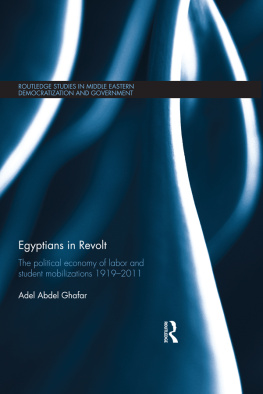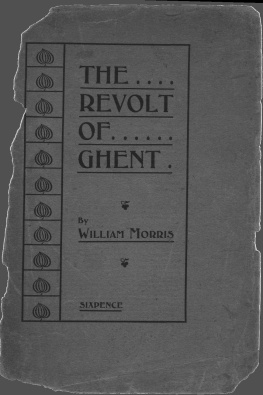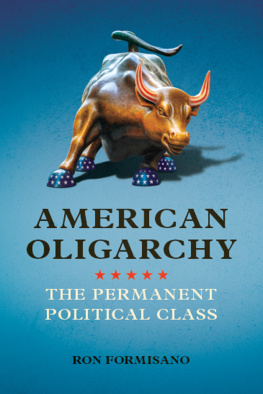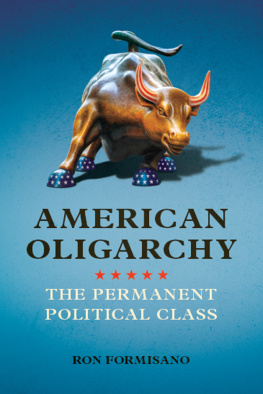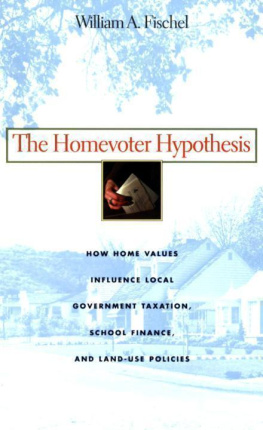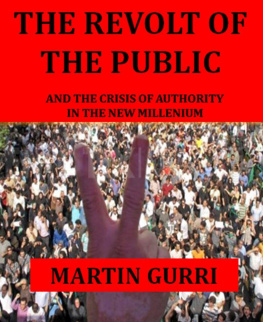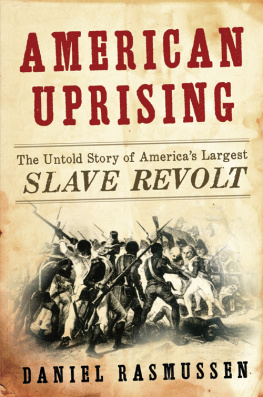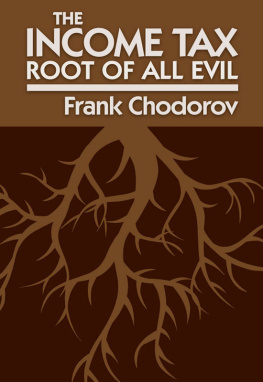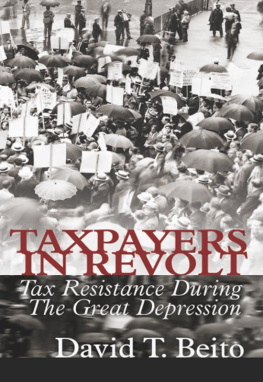Stanford University Press
Stanford, California
2008 by the Board of Trustees of the Leland Stanford Junior University. All rights reserved.
No part of this book may be reproduced or transmitted in any form or by any means, electronic or mechanical, including photocopying and recording, or in any information storage or retrieval system without the prior written permission of Stanford University Press.
Printed in the United States of America on acid-free, archival-quality paper
Library of Congress Cataloging-in-Publication Data
Martin, Isaac William.
The permanent tax revolt : how the property tax transformed American politics / Isaac William Martin. p. cm.
Includes bibliographical references and index.
9780804763172
1. Property taxUnited States. 2. TaxationUnited States. 3. United StatesPolitics and government. I. Title.
HJ4120.M37 2008
320.973dc22
2007044494
Typeset by Westchester Book Group in 10/14 Minion
Part of Chapter 4 first appeared in Isaac Martin, Does School Finance Litigation Cause Taxpayer Revolt? Serrano and Proposition 13, Law and Society Review 40 (3): 525557, 2006 Law and Society Association, published by Blackwell Publishing.
ACKNOWLEDGMENTS
THE PUBLIC FINANCES are one of the best starting points for an investigation of society, Joseph Schumpeter wrote in 1918, especially though not exclusively of its political life. They are also one of the best starting points for the acknowledgment of my many debts. The research for this book was supported financially by many public institutions. Foremost among them was the University of California, including the Institute for Labor and Employment (now the Labor and Employment Research Fund); various branches of the University of California at Berkeley, including the Graduate Division, the Townsend Center for the Humanities, and the Department of Sociology; and the University of California at San Diego, including the Division of Social Sciences and the Department of Sociology. The National Science Foundation supported the early data collection for the statistical analysis of tax limitation. So did the Lincoln Institute for Land Policya private institution, but, like every not-for-profit organization, one that is subsidized by a federal tax exemption. So my first and greatest debt of thanks is to the taxpayers who made this possible.
The book owes a tremendous intellectual debt to people who did pioneering research on the American property tax revolt. David Sears and Jack Citrin wrote the book on who voted for Proposition 13 and why. Clarence Los research demonstrated that Proposition 13 was the endpoint of a long evolution and taught me to pay attention to how the movements social base changed over time. Robert Kuttners research first drew my attention to the importance of assessment reform. And Harold Wilenskys comparative research on taxwelfare backlash inspired my own, comparative approach to understanding the property tax revolt. Careful readers will notice places where my judgments differ from some of the judgments of these scholars, but anyone who knows their work will also recognize my debts.
I am indebted to several people for conversations about my research design in the early stages: Tony Chen, Robin Einhorn, Jerry Karabel, Clarence Lo, Cathie Jo Martin, Jeffrey Stonecash, Kim Voss, and Margaret Weir.
The people who helped in various ways with the research process include Peter Brownell, who bought me an autographed copy of Howard Jarviss autobiography; Tony Chen, who put me up during a research trip to Ann Arbor; Peter and Judi Kleinman, who also put me up on that trip; Rebecca Hyde, who discovered the eerie parallels between Dixwell Pierce and Malcolm Davisson; Ji Sung-Jin, who collected and hand-entered much of the data for the quantitative analysis reported in Chapter 5; Paul Garcia-Reynaga, Eric Van Rite, and Nadav Gabay, who helped to collect some of the data on tax revolts around the world that informs the comparative discussion in Chapter 7; and Elisabeth Oxfeldt, who taught me Danish. I also depended on the labor and kindness of many librarians and archivists whose names I do not know. The Massachusetts tax rebels Barbara Anderson, Charles Faulkner, Don Feder, and Edward F. King graciously agreed to be interviewed early in my research, and I am deeply grateful for the time and kindness of these passionate activists.
Several people read the whole manuscript, sometimes more than once, and deserve special thanks. Margaret Weir read and commented on more early drafts of this project than anyone else and offered expert guidance at every stage. Robin Einhorn, Jerry Karabel, and Kim Voss also offered superb advice and generous encouragement. So did Tony Chen, Amy Hanser, Roger Haydon, Peter Katzenstein, Anna Korteweg, Ben Moody, Kimberly Morgan, Chris Rhomberg, Lynn Rivas, Teresa Sharpe, Jonathan Vanantwerpen, and Melissa Wilde, along with my mother, Ann Martin, and several anonymous reviewers. All of these people read most or all of the manuscript at least once and gave me kind and useful suggestions. People who read and offered helpful comments on shorter sections include Jrgen Goul Andersen, Balder Asmussen, Richard Bensel, Paul Burstein, Andrea Campbell, Nitsan Chorev, Bernhard Ebbinghaus, Davita Glasberg, Bill Hurst, Jan Bendix Jensen, Michael Baggesen Klitgaard, Martha Lampland, Asbjrn Sonne Nrgaard, Thomas Pallesen, Steve Pfaff, Kent Redding, Barbara Wejnert, and John Witte. Some of these people will be relieved that I am done sending them drafts. Others will be surprised to see their names here, because the chapters or conference papers they read many years ago are transformed beyond recognition.
I received excellent comments on parts of this project from audiences at the American Sociological Association, the Social Science History Association, the Policy History conference, the Center for Comparative Welfare Studies at the University of Aalborg, and the sociology departments at Indiana University, the University of California at San Diego, Harvard University, the University of California at Berkeley, and Columbia University.
I am grateful to everyone who helped me navigate the world of academic publishing, including Margaret Weir, Tony Chen, Melissa Wilde, John H. Evans, John Skrentny, Steve Erie, Jerry Karabel, Peter Katzenstein, Roger Haydon, and Kate Wahl.
The title is due to the fertile imagination of Amaha Kassa. He suggested some others, too, that are probably best not repeated here. He also told me it was a good idea to study the tax revolt and kept me focused on what was at stake. The book is dedicated to him.
INTRODUCING THE TAX REVOLT
TAXATION IS one of the most basic political issues. Taxes help to determine who gets what, when, and how. Tax policy also defines what government can do about every other issue, from health care to the environment to national defensebecause doing things takes money, and money means taxation.
For Americans in the twenty-first century, however, taxation is not just an important issue. Taxes, and tax cuts in particular, are the central domestic issue of our time. Candidates for Congress and the Presidency regularly campaign on the promise of tax cuts. Big, high-profile tax cuts appear like clockwork at the top of the domestic policy agenda. Since 2001, Congress has voted to abolish the tax on inherited wealth and has passed a major income tax cut almost every year, including two of the three largest income tax cuts in American history. Congress wrote sunset provisions into these laws that will keep tax cuts at the top of the political agenda for the foreseeable future. Influential politicians are openly pushing for even more tax cuts as a way to shrink the government by starving it of resources. Some politicians, including President George W. Bush and several Republican presidential candidates, have floated the idea of repealing the income tax altogether.


